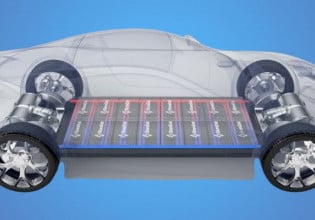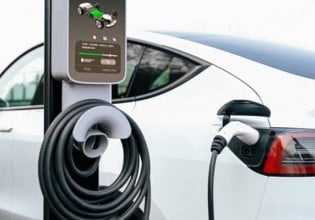UK Government Pours $1.7 Million into Long-Range EV Battery Project
British battery startup Nexeon will lead a 12-month project to deliver test EV battery cells combining lithium-ion cell design with silicon anode materials.
Nexeon, a U.K.-based provider of silicon anodes and other materials for battery applications, has landed £1.5 million (equivalent to around $2 million USD) from the British government to develop high-density battery cells designed to extend EV driving range.
Image courtesy of Nexeon
Through the 12-month project, dubbed Silicon Anode Battery for Rapid Electrification (or SABRE), Nexeon will work with battery startup Britishvolt and University College London to deliver test cells that combine advanced lithium-ion cell design with silicon anode materials, according to the announcement.
Britishvolt will provide computer-aided cell design and simulation services to integrate silicon into the anode design, with support from University College London’s Electrochemical Innovation Lab. Separately, Britishvolt recently announced a £2.6 billion gigafactory opening in 2023 to produce lithium-ion batteries for 300,000 electric cars annually by 2027.
The SABRE project will also use new cell assembly tools at the U.K. Battery Industrialisation Centre, a £130 million battery manufacturing facility that opened last month. At the facility, project engineers will fabricate 21700 rechargeable lithium-ion cells to test and validate the cell design.
“This project, and others like it, are important in building a UK-based lithium ion battery capability, and reducing risk in an increasingly competitive supply chain,” Nexeon CEO Scott Brown stated in the announcement.
SABRE is one of 17 EV battery projects to receive a total of £10 million from U.K. Research and Innovation, a public body of the British government. The funding was awarded through its Faraday Battery Challenge, a £330 million project supporting the development of safe, effective, high-performing, long-range batteries.
This isn’t the first time Nexeon has received R&D funding from the Faraday Battery Challenge. The organization, along with Innovate U.K., awarded Nexeon £7 million in 2018 to lead a £10 million battery research project dubbed Synthomer, UCL & Nexeon’s Rapid Improvement in the Storage of Energy (or SUNRISE). The project aimed to develop lithium-ion battery materials capable of achieving a range of 400 miles or higher. At its halfway mark, the project had produced silicon battery materials with longer life and higher energy density than existing market solutions.
The latest round of Faraday Battery Challenge funding reflects the U.K.’s ongoing investments in university- and industry-led projects focusing on guiding the country’s transition to electric vehicles. As announced last November, the government plans to ban the sale of new petrol and diesel cars in 2030 and reach net-zero emissions by 2050.






